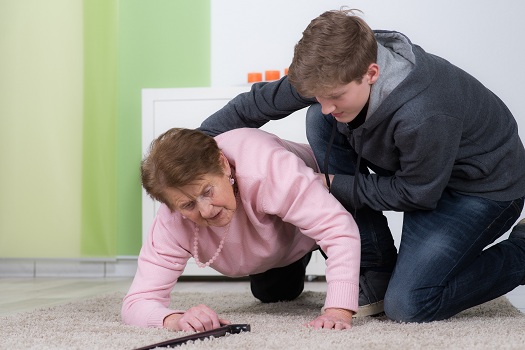Nearly 30 percent of seniors over the age of 65 fall at least once a year. In addition to impacting a senior’s physical health, these accidents can also take a toll on their mental and emotional health. Here’s a closer look at eight of the most common fall-related injuries in the elderly.
1. Broken Hips
According to the CDC, hip fractures are the most common fall-related injury among the elderly. Many different medical issues can increase a senior’s risk of hip fractures, including osteoporosis, poor nutrition, and arthritis. To strengthen weaker bones, seniors should stick to a healthy diet, supplement with calcium, and exercise for at least 150 minutes a week.
Aging adults who require assistance with the tasks of daily living can benefit from reliable home care. Anchorage, AK, families trust Home Care Assistance to provide the high-quality care their elderly loved ones need and deserve. Our caregivers are trained to help seniors prevent and manage serious illnesses and encourage them to make healthier decisions as they age.
2. Limb Fractures
These types of fractures generally take place when seniors reach out to catch themselves after they’ve already started falling. While healthy younger adults can recover from limb fractures in just a few weeks, seniors might develop permanent mobility issues after breaking a bone. Installing grab bars around your loved one’s home will provide something solid to hold onto if he or she begins to lose balance.
3. Mild TBIs
Bumps, bruises, and concussions are typically classified as mild traumatic brain injuries (TBIs). For most of these injuries, nothing can be done to speed up the healing process other than rest. However, you must schedule a brain scan if your loved one hits his or her head to make sure no permanent damage has occurred.
4. Severe TBIs
Severe traumatic brain injuries (TBIs) are extremely common, and they can be deadly if they aren’t treated immediately. Brain hemorrhages, skull fractures, and hematomas are all examples of severe TBIs. Anyone who has a severe TBI must be immobilized until a doctor or paramedic can safely move him or her.
Living with a serious health condition can make it challenging for seniors to age in place. However, they can maintain a higher quality of life with the help of professional live-in care. Anchorage seniors can benefit from assistance with meal prep, bathing, transportation to the doctor’s office, medication reminders, and much more.
5. Torn Ligaments
Torn ligaments often take place when seniors reach out to catch themselves while they’re falling. An older adult can easily tear a ligament after tripping over clutter or slipping in a puddle of water. Very little can be done to treat torn ligaments other than immobilizing the area.
6. Lacerations
As long as the cut isn’t too deep, most lacerations look much worse than they really are. Seniors who have difficulty with balance should keep glass items and other sharp objects off their counters, tables, and desks. Even though most lacerations are superficial, these wounds still need to be inspected and cleaned by a medical professional.
7. Spinal Cord Damage
The human spine is incredibly resilient, but it can still become damaged after being compressed or twisted. As a general rule, injuries that are higher up on the spine tend to be more severe. Spinal cord injuries should only be treated by a specialist, and most doctors will suggest getting a second opinion before any procedures are carried out.
8. Bruised Soft Tissue
When it comes to fall-related injuries, soft tissue bruises are relatively benign. Seniors might bruise their skin when they knock against items in their home or land on their knees as they fall. You only need to schedule an appointment with your loved one’s doctor if the bruises last for more than a week.
It’s extremely important to take measures to help older adults prevent falls and remain safe at home. One of the most challenging tasks of helping an elderly relative age in place safely and comfortably is researching agencies that provide elderly care. Turn to Home Care Assistance for reliable, high-quality in-home care for aging adults. We offer 24-hour live-in care for seniors who require extensive assistance, and we also offer respite care for family caregivers who need a break from their caregiving duties. Call one of our qualified Care Managers today at (907) 770-0907.
